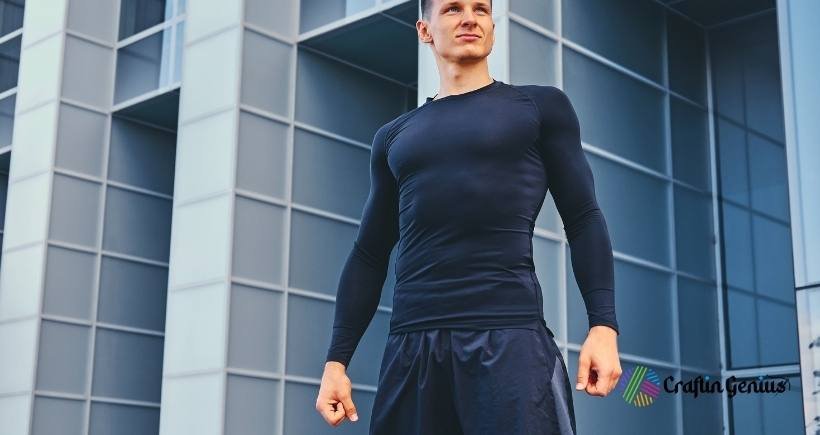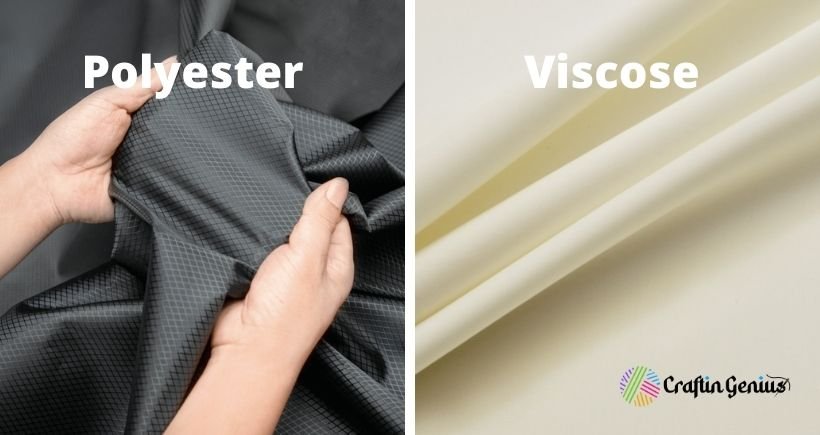The sense of comfortability, irritation, and a result of extremity in weather draw out crystal-like droplets from your skin. The droplets contain some content of salts, nitrogen, uric acid, and water, which give us the term sweat.
It is something that everyone wants to get rid of and have many connections with the outfit we wear. If your clothing can help you by taking out the sweat from your body, then why would you mind selecting so in the first place?
That is why people come up with questions like whether fabrics, especially polyester, are suitable for sweat. Or, to be exact, does polyester absorb sweat?

here is the short answer does polyester absorb sweat or not
Polyester is addressed as durable and moisture-resistant fabric, but don’t fool yourself by these words. Because, in actuality, polyester doesn’t absorb sweat at all. It exacerbates the scenario and lets the sweat particles push back into your skin, making you feel more uneasy and sweaty.
Does sweat go through polyester?
To be exact, before having it inside your brain, you first need to interpret deep into the origin of polyesters or synthetic fabrics.
Polyester is not naturally found in nature like cotton, linen, silk, wool, etc. And, it needs no telling that natural fabrics are way more prone to absorb moisture and sweat. So, being different, the artificial fabrics have a higher chance to act opposite to it.
That can also go for the materials like polyester, which is entirely fake out of long-chained polymers.
People, after the knowledge of good chemistry, have started to create innumerable alternatives of natural products. It is mainly due to meeting the ever-rising demands. Those synthetic components sometimes are better and, at times, can’t compete with the natural ones.
But, being a total imitated product, still, both of them will carry the slightest difference.
With that said, polyester is made especially to use with cotton. After the arrival of polyester, various concentrations of cotton-polyester blends became trendy in the market with better reviews.
Many people started to like those fabrics even more than 100% cotton. The main reason behind this is the balance, texture, and quality that they derive from the materials through the blend.
Many will say polyester is also used as an alternative to cotton, a longer-lasting version with balanced comfort. But, in that case, if someone wants to compare both the product, then a clear difference can be seen between the cotton and polyester in terms of absorption.
If your fabric absorbs the sweat when you put it on for a longer time, then the material must be cotton for sure.
But, in the case of polyester, the main differences can be spotted after going through the moisture absorption session. First, if you sweat even a little, they won’t go to vanish anywhere! That is to say, your polyester fabrics will absorb not a single particle of sweat.
Despite absorbing, the polyester fabric will motivate the sweats to sit more onto your skin and make you feel nowhere.
When the particles of labor are not getting absorbed by the material, they will feel the opposite reaction. This is to say that work will get pushed back on the skin and not create any chances to escape.
Related: Does Polyester Spandex Shrink In Dryer Or When Washed?
Is 100% polyester suitable for sweat?
In a polyester Cotton blend, you can always see opposing behaviors from the two different types of fabrics. Cotton is a natural fabric with its fixed and definite behavior and character. The same goes for polyester, whose actions are also substantial but different from cotton.

In the blend of cotton polyester, one component balances out the other. So, both of them are used in proper concentrations for the particular sort of fabric that one wants.
The job of cotton is o provide softness and comfort to the fabric to fulfill the user’s demand. Among those, one of the leading characteristics of cotton is a moisture-soaking tendency. That is to say; cotton cares a highly absorbent product that absorbs moisture and sweat entirely from your body and preserves them within their internal bondings.
But when too much of the spring characteristic remains within a fabric, the fabric becomes prone always to stay damp. Such kind of condition makes your outfit look wet and destroys your outlook.
So, to balance out that cotton feature, the polyester with malicious behavior is injected into the blend of cotton polyester. The importance of polyester came in this way which balances out the absorbent part of the cotton. That makes the polyester non-absorbent fabric and therefore not soak out your sweats.
Synthetic fabrics like polyester are made to balance out the outcomes of natural materials and, at some times to alternate the natural fibers.
That brings to us that what may happen in a fabric made entirely out of 100% polyester? The answer has become relatively easy for you now.
For a cotton-polyester blend with a higher concentration of polyester, the fabric will remain on the more fantastic side of not absorbing sweat. And, for a higher concentration of cotton, the material will be reasonable to absorb sweat more than pushing away the moisture.
So, in the case of fabric entirely made of 100% polyester, the ultimate output would be the inability to absorb sweat. Therefore, whether a 100% polyester fabric is suitable for work or not would be decided by you and your purpose.
If you want your fabric to absorb out the sweat and make your body stay free from the sweat traces, then, of course, it would be a perfect option.
On the other hand, if you want a dry and fresh look out of your outfits and also want your body new and free from sweat at the same time, then 100% polyester would not be the one that you are looking for.
best material to absorb sweat – 5 best Sweat-Resistant Fabrics
We can compare the two criteria, sweat-resistant and sweat-absorbent, by differentiating between synthetic and natural fabrics.
That is to say, almost most artificial synthetic fabrics are sweat-resistant, whereas natural plant-based materials are sweat-absorbent.
Polyester, Nylon, Rayon, spandex, and acrylic are more on the side of the sweat-resistant feature.
On the other hand, cotton, silk, muslin, wool, and linen are sweat-absorbing fabrics.
Polyester or Viscose – Which Is Better For Hot Nights?
Polyester and viscose both are better in terms of your need. However, when both are used according to their strength, both can serve best for hot nights.

Polyester is water-absorbent, making them better over viscose as you are more prone to sweat during hot nights.
Whereas viscose will serve better than polyester if you keep them away from moisture because they cannot hold up well when remaining soaked.
Does polyester wick away sweat?
No, polyester neither absorbs sweat nor do they wick out them.
They are absorbing and wicking out sweat is not the same thing in the first place. Unfortunately, people often mix up these two terms and make the wrong decision in terms of the fabric selection and purchase.
Depending on the individual needs, fabrics like cotton or polyester are chosen for clothing.
Fabrics that absorb the moisture and evaporate away from the same into the air are regarded as moisture-wicking clothes. People who want their fabrics to provide a fresh-dry look throughout the whole day and keep their skin fresh from sweats always need such fabrics.
Fabrics like polyester, which don’t absorb the sweat, actually can provide you with sweat-wicking capability.
Such kinds of materials can make you relieve from the problems of efforts and wet patches on outfits depending on the type of weaving. For example, most polyester clothes with athletic wear tend to provide moisture-wicking capability compared to other types of polyester fabrics.
Is 100% polyester breathable?
Yes, 100% polyester is slightly breathable thanks to its moisture-wicking tendency for microfibers. But, don’t even try to compare it with the natural fabrics that are so desirable for summer wears for the section of breathability.
Polyester fabrics are water-resistant, but due to this, there comes an impact on their breathability. More breathable fabrics tend to absorb moisture as well. But, as you know, polyester doesn’t absorb any liquid substances; their term of breathability can also be derived from this.
But, we should not forget the fact that the air is more light in weight and tends to penetrate smaller holes than the liquid. And, the breathability is also determined through the passing of air, which brings us that polyester is anyway breathable.
Does polyester make you stink?
Yes, polyester can make your body stink with sweat as the fabric would not wick or absorb away the produced sweat from your body.
Your body remains wholly surrounded by the released sweats as the polyester fabric will push them back from where they came from. And, staying of those sweat particles for a long time can end up removing terrible odor and make you stink.
What fabric absorbs the most sweat?
Fabrics that have higher absorbing and capturing fiber contents tend to absorb the most sweat. One such fabric of all time is cotton from a natural source.
Cotton that is found in cotton plants does this job pretty quickly with the most sweat-absorbing feature. But, nowadays, many other such fabrics come that do this job even better.
Some of those fabrics are made out of the fibers like modal, micro modal, etc.
FAQ about does polyester make you sweat
1. Is cotton more breathable than polyester?
Of course, being a natural fabric, cotton dominates significantly over polyester in terms of breathability. In addition, cotton is a more summer-tolerant fabric suitable for passing air from outside to your body than polyester.
2. Is cotton or polyester sweat better?
Cotton is better in terms of sweat control compared to polyester. Because cotton can absorb sweat whereas polyester can’t, cotton with microfibers can also wick sweat which some athletic polyester fabrics can only do.
Our verdict on does polyester make you sweat
The sweat molecule can’t even be evaporated in the case of fabric like polyester. Thus, it will make you uncomfortable and feel hotter, sticky, and many problems created by sweat. Also, you have a higher chance of building skin rashes and allergies due to excessive efforts inside your clothes.

Emily’s passion for crafting knows no bounds. She has spent years perfecting her skills, from mastering intricate knitting patterns to sculpting beautiful ceramics and everything in between. Her artistic talents have made her a force to be reckoned with in the crafting community.
